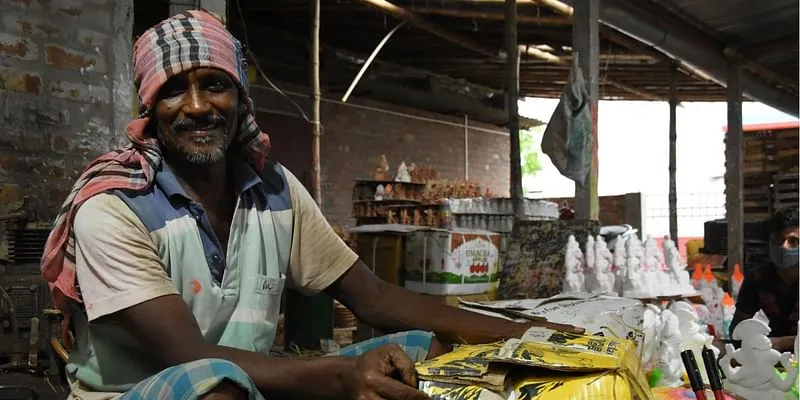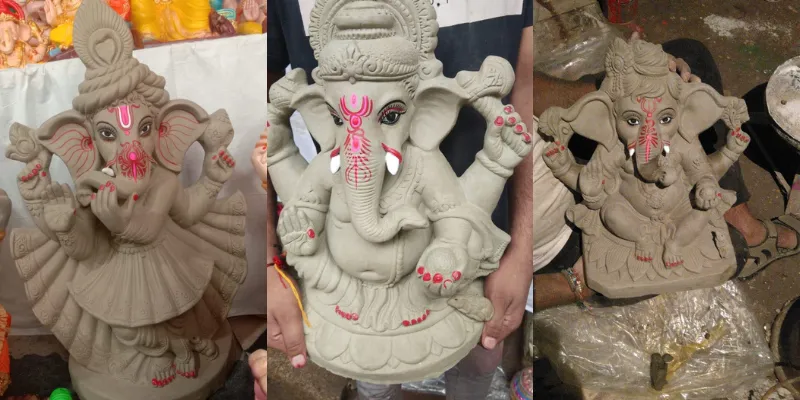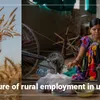How small businesses took the sustainability route this Ganesh Chaturthi
Ganesh Chaturthi celebrations are in full swing across the country, and this time, sustainability drove the festive enthusiasm. Here’s how small businesses and artisans met the demand for eco-friendly ganesha idols this year.
For the past few years, environmental sustainability has been one of the foremost concerns. Even in India, which celebrates many festivals, eco-friendly festivals are gradually gaining momentum, which has accelerated the demand for sustainable products.
During Ganesh Chaturthi, a 10-day long festival celebrated across the country, devotees bring ganesha to their homes and perform visarjan (immersion in the water) on the last day. These idols are made from toxic, non-biodegradable materials such as Plaster of Paris (PoP), artificial colours, etc., which do not fully dissolve when immersed in water bodies, and end up contaminating it.
Concerned over environmental issues, artisans are now offering innovative and eco-friendly options to celebrate Ganesh Chaturthi and other festivities in the days to come. And small businesses have been quick to meet the changing demand.
Pratap Singh, a Delhi-based wholesaler of ganapati idols, says:
“Itne pyaar se jab ganesha ko ghar lakar pujte hain, uske baad wo kahin kude ke dher pe mile, toh dukh hota hai. Log ab chah rahe hain ki eco-friendly murtiyan lein (When people welcome and worship ganesha at their home, they get disheartened to see the same idol in the pile of waste. People are shifting towards buying eco-friendly ganesha idols).”
He says people were slowly shifting towards buying sustainable ganesha idols, and the pandemic further accelerated the demand for them.
“The Maharashtra government has also put a ban on big size ganesha idols and are promoting eco-friendly ganesha idols. This time, we saw demand for sustainable and smaller ganesha idols between the size of 18 to 22 inches,” Pratap tells SMBStory.

Image courtsey: MyPoojaBox
The impact of sustainability on business
Sustainable products are now in high demand, says Kaveri Sachdev, Co-founder and CEO of MyPoojaBox, a direct-to-consumer (D2C) company that provides a single window solution for all pooja needs.
“We started making eco-friendly ganesha idols in 2017. Though the demand for sustainable idols was growing, we have seen 100 percent growth in the last two years, and the reason I feel is the raising awareness towards controlling pollution,” Kaveri adds.
She says that this ganesh chaturthi, there was more demand for one-feet size idols instead of the usual big ones.
“People now want to buy a smaller idol, which can be immersed in a water tub in their home itself and not in any river,” Kaveri explains.

Kaveri Sachdev, Co-founder and CEO, MyPoojaBox
The company also saw new buying trends like plantable ganesha, non-coloured idols, and clay ganesha. Even offline markets saw the same trend and consumers were on the lookout for sustainable idols, Kaveri adds.
Pivot and persist
It is not just the buyers and sellers, but even the sculptors have pivoted to making pure clay idols owing to the change in demand, and they say this has benefitted their business as well.
According to Rani Devi, a small seller of clay items from Lucknow, this year, sustainable idols saw demand coming in from new customers who didn’t celebrate this festival earlier.
“Hum jaise chote karobaar walon ko kafi fayda hua hai isse (this trend has increased business opportunities for small businesses like us),” she adds.
Pratap says, this year, the major procurement of clay ganesha idols in North India was from Kolkata. “Now, the demand for ganesha idols is not limited to Maharashtra, it comes from across the country, which also increases our business.”
Maharashtra sculptors have mostly been making PoP idols, and with the changing demand scenario, Pratap says they are also shifting to making clay idols, but at a smaller scale compared to other regions.
Across the country, sculptors have also pivoted to making ganesha idols from cow dung, papier mache, and others.

Image courtsey: Pratap Singh
Ganesha idols in demand this Ganesh Chaturthi
A sustainable festive season
The festive season has started in the country with Navratri, Dussehra, and Diwali around the corner, and Pratap says the demand for sustainable products will drive the upcoming festive season.
“We are prepared for Diwali as we could sense consumers are more desirous to buy eco-friendly products than before,” he adds.
Kaveri also foresees that demand for sustainable diyas and home decor items will prevail in the coming festive season, and she is already making plans to introduce more eco-friendly products on her website.
YourStory’s flagship startup-tech and leadership conference will return virtually for its 13th edition on October 25-30, 2021. Sign up for updates on TechSparks or to express your interest in partnerships and speaker opportunities here.
For more on TechSparks 2021, click here.
Edited by Megha Reddy









